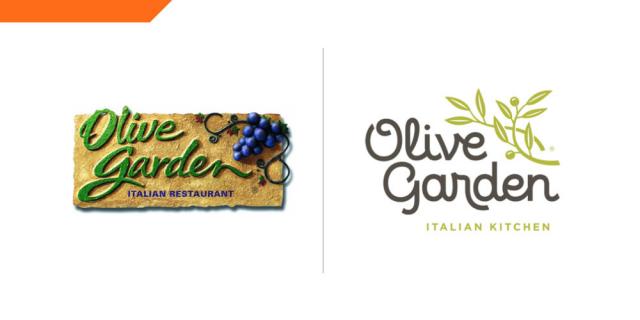Olive Garden hopes a new logo will add a little spice to its cucina
Olive Garden is well known as the restaurant chain of Italian-American fast casual dining cuisine, which touts an endless supply of bread sticks and salads. During an investor presentation this month, the owners announced that with, “same-restaurant sales lagging Knapp-Track ratings recently,” they are, “implementing a comprehensive brand renaissance plan to regain momentum,” that includes a completely redesigned logo. And as our Charlotte marketing agency knows all too well, staying relevant to your target consumers in this era of simplified design — while attracting new consumers — is not a simple task to undertake.
The reaction was immediate and scathing. “It looks like a second grader’s cursive practice” griped Slate. That was polite compared to BusinessInsider.com’s brutal “People hate Olive Garden’s new logo.” The closest thing to a compliment from any major publication was Time.com which skipped straight over the relative aesthetics of the simplified text and less ornate new look and took a shot at the entire chain by noting that “Olive Garden’s new logo probably can’t save Olive Garden.”
As rough as the reaction was for Olive Garden’s corporate parent, the abuse was probably a welcome reprieve from what it’s been hearing from Wall Street. Shares of Darden Restaurants (NYSE: DRI) are down more than 10% already in 2014. Darden has responded to pressure from investor activists by announcing a plan to spin off its Red Lobster division. As we’ve discussed in a recent blog post, middle-class brands like Olive Garden and Red Lobster are struggling as America’s middle class continues to lose spending power.
Darden better hope something happens to change its fortunes soon because the wolves are at the door. With customer traffic down 13% in December and sales off 5.4% in the third quarter, investors like Barington Group haven’t been shy about suggesting ways Darden can increase shareholder value. In a recent webcast Barington suggested Darden split into three different companies. Under Barington’s plan Darden would lump Olive Garden and Red Lobster into a mature brand parent company, put Darden’s other chains under an umbrella dedicated to more rapid growth, and spin off real estate assets entirely.
Darden insists its plans are sufficient and is refusing to argue the point in public. Darden recently cancelled its shareholders’ meeting, opting instead for a roadshow where it will meet institutional investors on an individual basis.
Running away from activists and throwing out an immediately despised logo may buy Darden some time, but unless customers start buying more meals Olive Garden and the rest of the corporation can run, but they won’t be able to hide for long.


